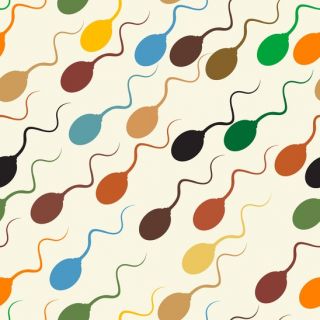Autism
Should Young Men Freeze Their Young Sperm?
Does older men + older sperm = possible baby problems?
Posted November 8, 2012

For what feels like forever, the onus has been on older mothers if something is wrong with the baby. When it comes to carrying part of the burden, the age of sperm may be a more serious reproductive issue for men than previously known or acknowledged.
Changing the reproductive blame and guilt game
A recent study published in Nature magazine reports that older dads—not moms, as was frequently assumed—may be more responsible for passing on mutations that lead to developmental problems such as autism and schizophrenia. According to the study, the age a man fathers a child determines how many mutations will be passed on. As a man ages, there is an exponential increase in the number of mutations occurring in his sperm. In studying trios of Icelandic families, the team discovered that where a father would pass on as many as 55 new mutations, a mother would only pass on 14, no matter what her age.
The birth rate for women in their early 40s rose in 2010, the only age-specific rate to do so. Men have had a more or less “free-ride” in the guilt and blame department. The mere fact that data on women’s ages at delivery is readily available hints at men’s role in the equation. In contrast, the father’s age is missing for 14 percent of all births and for 36 percent of all non-marital births, according to the Centers for Disease Control.
Although older moms are often stigmatized for having “older eggs” that can lead to developmental complications, the fact that “sperm is continually being generated by dividing precursor cells, which acquire new mutations with each division,” places new responsibility on men.
Will men’s biological clocks tick louder?
Only in recent years have men considered their biological clocks. As science learns more, men’s attitude may change. While most mutations do not result in developmental issues, there is a strong implication that older fathers are more likely than younger fathers to bequeath genes connected to autism and schizophrenia to their child.
In their book, A Baby at Last!, Drs. Zev Rosenwaks and Marc Goldstein of Weil Cornell Medical Center note: “Male fertility drops with age, and genetic abnormalities in sperm increase significantly over the age of thirty-five. Paternal age over forty-five is also associated with five times higher risk of fathering a child with autism, twice the risk of Down syndrome, and twice the risk of major congenital abnormalities.”
Is this the dawn of a new age when men, like women, become apprehensive about the age at which they become parents? Going forward, will more men start freezing their sperm when they are young?
Resources:
Callaway, Ewen. "Fathers Bequeath More Mutations as They Age." Nature.com. Nature Publishing Group, 22 Aug. 2012. http://www.nature.com/news/fathers-bequeath-more-mutations-as-they-age-1.11247
Carey, Benedict. "Study Finds Risk Of Autism Linked To Older Fathers." The New York Times. The New York Times, 23 Aug. 2012. http://www.nytimes.com/2012/08/23/health/fathers-age-is-linked-to-risk-of-autism-and-schizophrenia.html?emc=na
Hamilton, Brady E., PhD, Joyce A. Martin, M.P.H., and Stephanie J. Ventura, M.A. Births: Preliminary Data for 2010. Vol. 60. No. 2. Centers for Disease Control and Prevention National Center for Health Statistics National Vital Statistics System. 17 November 2011. <http://www.cdc.gov/nchs/data/nvsr/nvsr57/nvsr57_07.pdf>
Martin, Joyce A., M.P.H., Brady E. Hamilton, PhD, Stephanie J. Ventura, M.A., Paul D. Sutton, PhD, Fay Menacker, Dr. P.H., Sharon Kirmeyer, PhD, and T.J. Mathews, M.S. Births: Final Data for 2006. Vol. 57 No. 7. Centers for Disease Control and Prevention. 07 January 2009. http://www.cdc.gov/nchs/data/nvsr/nvsr60/nvsr60_02.pdf
Rosenwaks, Zev, Marc Goldstein, and Mark Fuerst. A Baby at Last!: The Couple's Complete Guide to Getting Pregnant, from Cutting-edge Treatments to Commonsense Wisdom. New York: Touchstone, 2010, page 71. http://www.amazon.com/Baby-Last-Pregnant-Cutting-Edge-Commonsense/dp/1439149623/ref=sr_1_1?ie=UTF8&s=books&qid=1275510287&sr=1-1
- Follow Susan Newman on Twitter.
- Sign up for Dr. Newman's periodic Family Life Alert Newsletter
- Visit Susan's website: www.susannewmanphd.com
- See Susan’s latest book: The Case for the Only Child: Your Essential Guide
Copyright 2012 by Susan Newman




